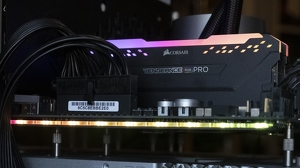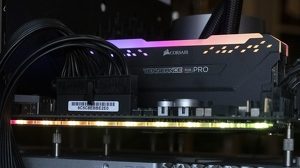

Last month, we tackled the age-old question of whether RAM speed matters for gaming performance. Using an Intel Core i9 test bed, we concluded that yes, you can see measurable frame-rate gains from faster memory performance, with higher frequencies providing a larger boost than tighter timings, and 3200MHz RAM emerging as the standout value choice. Today, we turn our attention to AMD Ryzen systems in part two of our RAM gaming performance tests.
Ryzen processors have historically proven more sensitive to RAM speed than their Intel Core counterparts, so we expect to see even greater performance gains from high frequency RAM on our AMD test bed. As in part one, in-game frame-rates are the primary focus here, with three CPU-heavy games tested. We’ve also thrown in some content creation workloads to see whether faster RAM can speed up common tasks like transcoding or rendering. Finally, this article closes out with our guide to purchasing RAM for Ryzen systems, based on our test results.
As before, we’ll examine how our high-spec RAM functions with its standard and tightened timings, and we’ve significantly widened the range of frequencies tested too. In our Intel tests, we tested from 3000MHz to 4000MHz in steps of 200MHz, whereas here we’ve tested frequencies from 2133MHz to 4000MHz in steps of 400MHz. That means your particular RAM frequency might not be represented in the results, but you’ll get a much better idea of how lower (and still relatively common) RAM speeds like 2400MHz and 2666MHz can affect both gaming and content creation workloads.
Last month, we tackled the age-old question of whether RAM speed matters for gaming performance. Using an Intel Core i9 test bed, we concluded that yes, you can see measurable frame-rate gains from faster memory performance, with higher frequencies providing a larger boost than tighter timings, and 3200MHz RAM emerging as the standout value choice. Today, we turn our attention to AMD Ryzen systems in part two of our RAM gaming performance tests.Ryzen processors have historically proven more sensitive to RAM speed than their Intel Core counterparts, so we expect to see even greater performance gains from high frequency RAM on our AMD test bed. As in part one, in-game frame-rates are the primary focus here, with three CPU-heavy games tested. We’ve also thrown in some content creation workloads to see whether faster RAM can speed up common tasks like transcoding or rendering. Finally, this article closes out with our guide to purchasing RAM for Ryzen systems, based on our test results. As before, we’ll examine how our high-spec RAM functions with its standard and tightened timings, and we’ve significantly widened the range of frequencies tested too. In our Intel tests, we tested from 3000MHz to 4000MHz in steps of 200MHz, whereas here we’ve tested frequencies from 2133MHz to 4000MHz in steps of 400MHz. That means your particular RAM frequency might not be represented in the results, but you’ll get a much better idea of how lower (and still relatively common) RAM speeds like 2400MHz and 2666MHz can affect both gaming and content creation workloads.Read moreEurogamer.net



